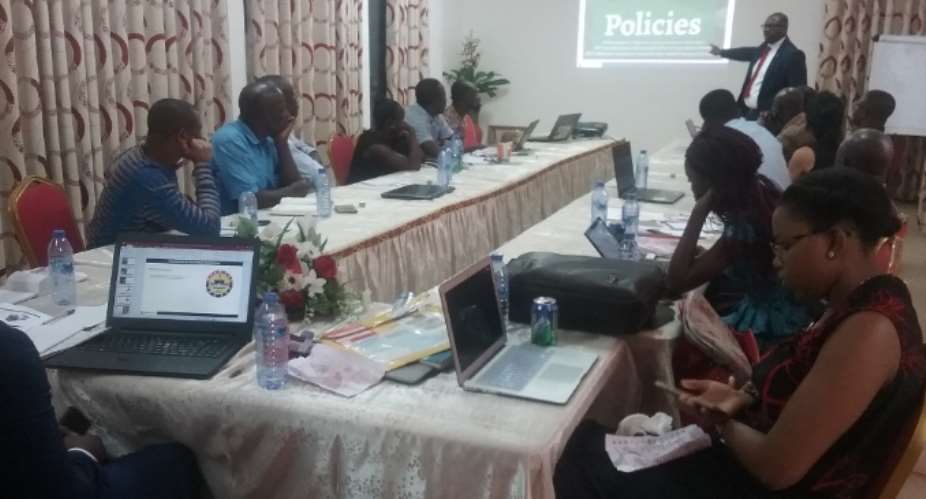Friends of the Earth Ghana in partnership with Tropenbos Ghana and Rocha Ghana has organized a capacity building workshop for Civil Society Organizations (CSOs) on Ghana’s mining and forestry laws.
The Green Livelihoods Alliance, kindly funded by the Ministry of Foreign Affairs of the Netherlands, is concerned with building a strong civil society for inclusive and sustainable development in forested landscapes of Ghana and eight other countries across the world.
The workshop was necessitated based on the determination of the Ghana government to mine bauxite in some of the country’s protected forest reserves despite its extremely damaging consequences, and the ongoing discussions around reforming tree tenure and benefit sharing to ensure communities’ rights are upheld.
Nana Tawiah Okyir, a resource person from the Taylor Crabbe Initiative said the ‘consideration stage’ in the law-making process is the critical stage for civil society.
“This is when Parliament makes changes to draft bills, so civil society and communities can make inputs and comments or request an MP to introduce an amendment for consideration. Thus this is when communities and civil society can make their views known and lobby for change,” he stated.
Lawyer Dennis Martey of Taylor Crabbe highlighted Ghana’s minerals and mining law and how this sits within Ghana’s Constitution.
He said with timber exploitation in Ghana’s forests, the work of civil society is important in closely monitoring the activities of mining companies to determine whether their actions are consistent with Ghana’s laws.
“Important for civil society to know is that they can find out the location of mineral rights and details of the rights holders in the register of mineral rights maintained by the Minerals Commission,” he noted.
Lawyer Martey noted the need for reform in the existing legal system to ensure a mandatory Environmental Impact Assessment (EIA) prior to the award of per, as is currently the case.
Obed Owusu-Addai of Ecocare Ghana who led the participants in developing strategies to maintain momentum said the actions included provision of simplified information and trialing different formats for educational materials, and creating databases of key information useful for future advocacy work.
Friends of the Earth Ghana, which has been a leader in supporting communities to monitor timber companies for legal compliance, encouraged participants to further educate the communities and civil society groups they work with to ensure they have the necessary capacity to monitor mining and logging operations in their localities.
The high rate of logging in Ghana and the constant private sector demands for mining concessions in protected forests are very worrying trends, especially for communities relying on the forests for their basic needs and livelihoods.
Friends of the Earth Ghana recognises that communities threatened by logging or mining, together with the Civil Society Organisations (CSOs) that defend community and environmental rights, are crucial for monitoring logging and mining companies to ensure they do not step beyond the bounds of Ghana’s laws.






 Tuesday’s downpour destroys ceiling of Circuit Court '8' in Accra
Tuesday’s downpour destroys ceiling of Circuit Court '8' in Accra
 SOEs shouldn't compromise on ethical standards, accountability – Akufo-Addo
SOEs shouldn't compromise on ethical standards, accountability – Akufo-Addo
 Father of 2-year-old boy attacked by dog appeals for financial support
Father of 2-year-old boy attacked by dog appeals for financial support
 Jubilee House National Security Operative allegedly swindles businessman over sa...
Jubilee House National Security Operative allegedly swindles businessman over sa...
 Nobody can order dumsor timetable except Energy Minister – Osafo-Maafo
Nobody can order dumsor timetable except Energy Minister – Osafo-Maafo
 Mahama wishes National Chief Imam as he clock 105 years today
Mahama wishes National Chief Imam as he clock 105 years today
 J.B.Danquah Adu’s murder trial: Case adjourned to April 29
J.B.Danquah Adu’s murder trial: Case adjourned to April 29
 High Court issues arrest warrant for former MASLOC Boss
High Court issues arrest warrant for former MASLOC Boss
 Align academic curriculum with industry needs — Stanbic Bank Ghana CEO advocates
Align academic curriculum with industry needs — Stanbic Bank Ghana CEO advocates
 Election 2024: We'll declare the results and let Ghanaians know we've won - Manh...
Election 2024: We'll declare the results and let Ghanaians know we've won - Manh...
